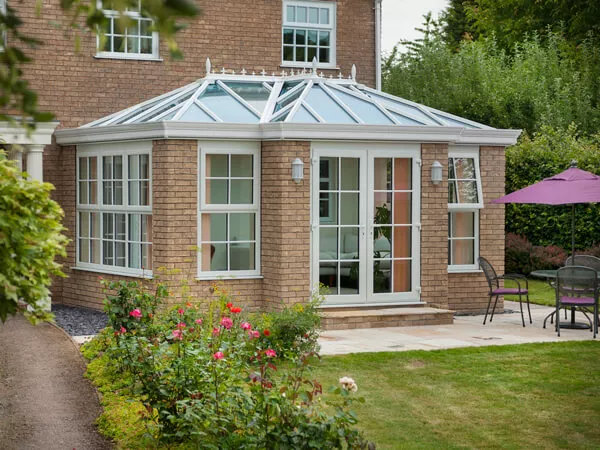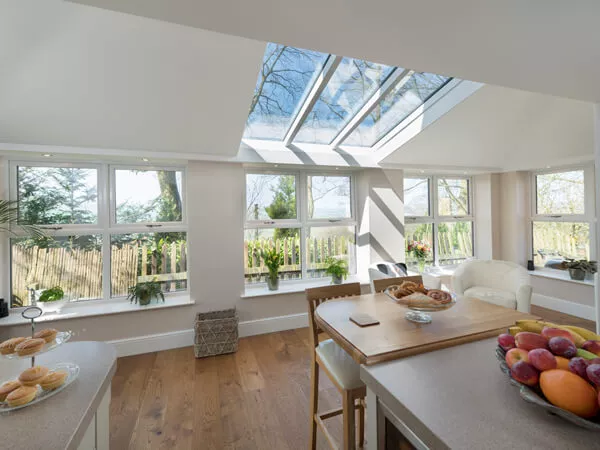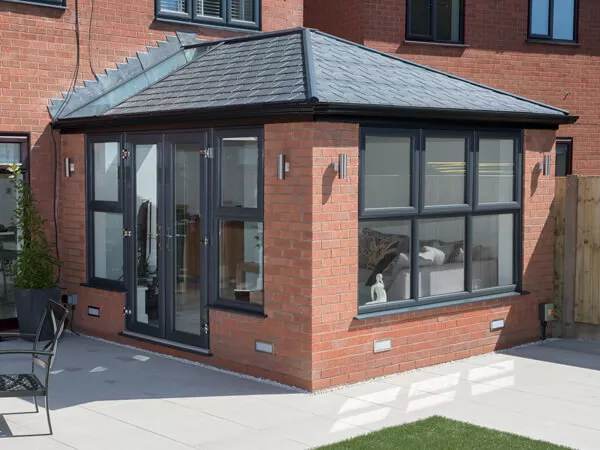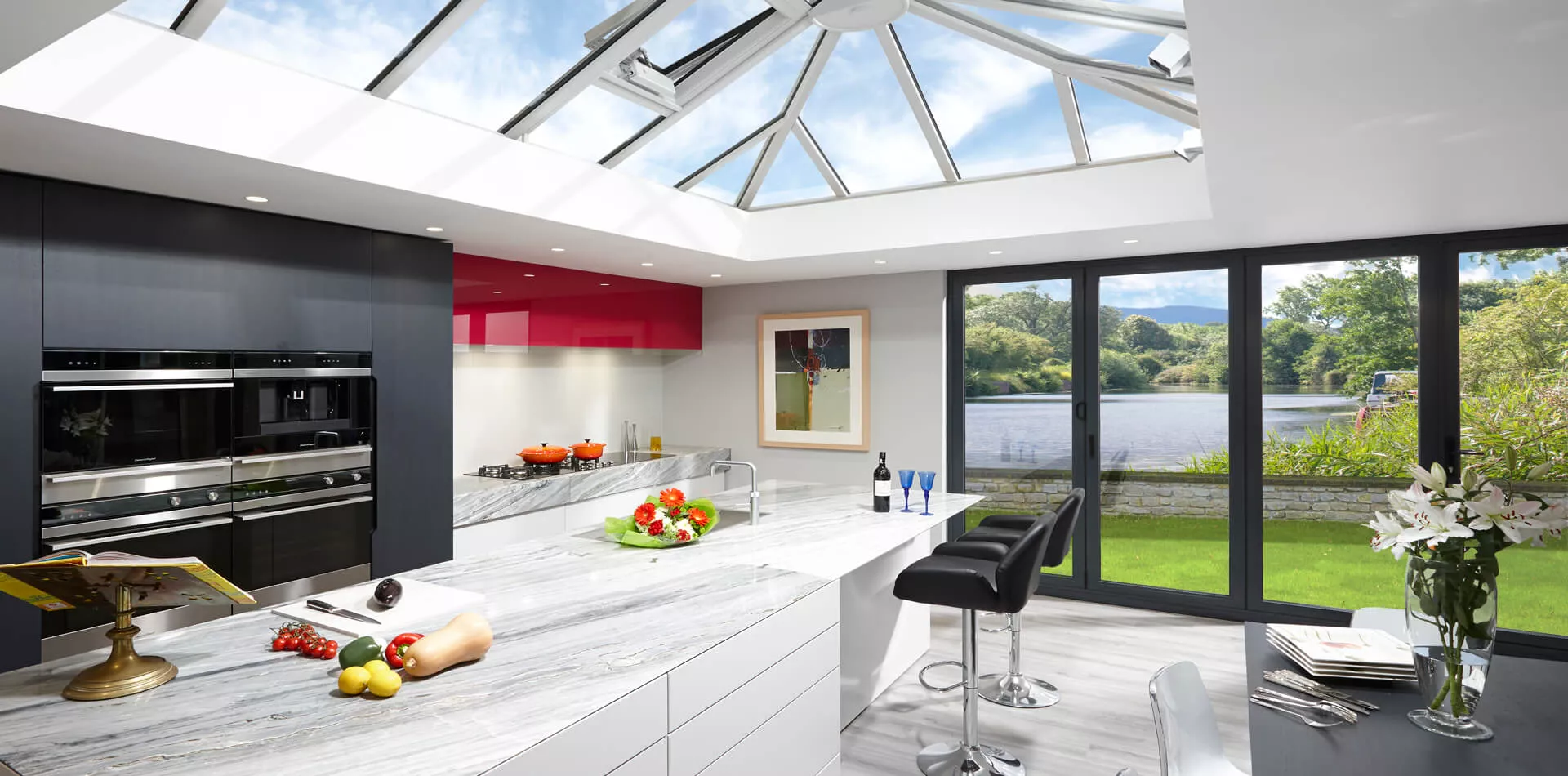Can you tell me the difference between a conservatory, orangery and extension?
This is one of the questions that we’re asked most often and to tell you the truth, we try not to define our living spaces in this way as things have become so blurred now. Generally, a conservatory will predominantly consist of glass, with a glass roof, glass walls etc. to give you a beautifully transparent view. We have though seen a shift with many conservatories now featuring a solid tiled roof to further the energy efficiency they offer, particularly so when they also include dwarf walls. We have a fine selection of solar control glazing too, which will help with temperature control.
As for an orangery. Typically, it will have brick or aluminium pillars, which is why an orangery tends to feel so cosy inside and luxurious with it. Around the inside of the roof will also be a pelmet, which contributes to the insulating qualities of the extension and is where spotlights and downlighters can be fixed into. The roof covering can be a combination of a glass lantern and solid tiled roof or just either of the two.

If you’re keen to extend your property in the most natural possible way, we would definitely recommend a home extension. It will be a resolutely solid structure thanks to being largely made using brickwork, and normally be covered with a tiled roofing system. The roof can be hybrid, if you wish, coming with full length glass panels and / or Velux windows, keeping it suitably bright inside and well-ventilated. It will be amongst the comfiest rooms in the house, throughout the year.
Let’s be honest, does it really matter what you can call these extensions? For help deciding on one, speak to a consultant.

Would I be best buying a tiled roof or glass roof?
That will come down to a series of things, including how you intend to use the extension, where it will be positioned and the direction it will face, and what your available budget is. If it’s lots of natural light that you want, along with a nice view, the good news is that solar control glazing is really sophisticated now and will be a solid insulator.
With a solid roof on top of your extension, you can look forward to earning a space that’s fit for all-year round purposes. Full length glass panels and Velux windows can be inserted into this roofing system, making it a mixture of a solid and glass roof.
Chat through our roofing systems with a TWC consultant to decide which will be the best of them.

MORE COMMON QUESTIONS
You can always turn to one of our advisors if you have some questions. We’ve put together some common questions below that you might find helpful.
Will I experience any thermal-related issues?
You shouldn’t do as TWC makes a concerted effort to ensure that our living spaces can be used all-year round. In contrast to the old conservatories with polycarbonate roofs that burn up considerably in hot weather, our home extensions keep cool and will adjust to the seasons so that you’re never left too hot or too cold. For further reassurance of climate control, include a solid tiled roof.
Do you manufacture your roofs?
We are delighted to confirm that we do, as TWC is a Conservatory Outlet Network member and its sister company, Conservatory Outlet, is one of the UK’s leading roof manufacturers. The roofs are built in a facility in Wakefield.
Having such close links with the team that manufactures our roofing systems is a big plus as it helps us to keep tabs on our supply chain. We can then ensure that high standards are maintained.
Am I allowed to have different roof tiles so they match my home’s?
That can easily be arranged. TWC provides shingle and slate tile roof options, so there shouldn’t be any issue with closely matching the roof tiles to those on your house. We also have some flat roof membranes available. More information can be sought from a member of the TWC team.
Can you explain what ‘A’ rated windows are?
The most energy efficient windows sold in the UK have an ‘A’ energy rating. You will see when buying new replacement windows that they all carry an energy efficiency label so that you can identify the level of energy efficiency that they offer and whether they comply with Building Regulations.
Windows are energy rated from A-E, with an ‘A’ rated window being the most energy efficient and an ‘E’ rated window being the least energy efficient. Pay attention to the energy efficiency standards of new windows when you are looking to buy them so that you know the thermal qualities they will deliver.
What is solar control glazing?
Using just the naked eye, you cannot see the coating on our solar control glazing. But just because it isn’t visible, doesn’t mean that it doesn’t play an important role, which is to stop excess heat from entering into a house and too much from escaping. We can tint the glass in various ways, doing so depending on how much light transmission and heat retention you want and need.
Is it possible to match to my existing bricks?
TWC will do its utmost to locate a suitable matching brick for your property, ahead of us beginning the job of building your extension. We will inform you of potential weathering and manufacturing differences between new and existing bricks. The brickwork can be tinted if we have difficulty finding a suitable match, but we must advise that this can involve an additional charge.
Will Building Regulations Approval be necessary?
You will often need Building Regulations Approval to extend a house, but not in all cases. A surveyor from TWC will visit your home to assess things and they will be able to confirm if it will need to be obtained or not. If they say that Building Regulations Approval must be sought, they will explain what’s involved and we will do the necessary work to get it organised.
Do I need planning permission?
When your extension falls under Permitted Development Rights, you do not have to apply for planning permission, so long as these conditions are satisfied:
- The ground area covered by the extension and any other buildings within the boundary of the property, excluding the original house, is not more than half the total area of the property.
- Any part of the extension is not higher than the highest part of the roof of the existing house.
- The eaves of the extension are not higher than the eaves of the existing house.
- Any part of the extension does not extend beyond any wall facing a road if it forms the principal or side elevation of the original house.
- The eaves are no more than 3 metres in height if any part of the extension is within 2 metres of the property boundary.
- The materials used in exterior work, except in the case of a conservatory, are of similar appearance to the existing house.
- An upper floor window on a side elevation within 15 metres of a boundary with another house is obscure glazed; and is non – opening unless the parts which can be opened are more than 1.7 metres above the floor of the room in which the window is installed.
- A side extension does not exceed 4 metres in height or be wider than half the width of the original house.
- In a single storey extension
- the extension does not extend beyond the rear wall of the original house by more than 4 metres for a detached house or 3 metres for any other type of house;
- the height of the extension does not exceed 4 metres;
- no part of the extension is within 3.5 metres of any property boundary with a road opposite the rear wall of the house.
- In an extension with more than one storey
- the extension does not extend beyond the rear wall of the original house by more than 3 metres;
- no part of the extension is within 7 metres of the property boundary opposite the rear wall of the house;
- the roof pitch of the enlargement is as far as practicable the same as that of the original house.
- If you live in a house within a conservation area, World Heritage Site, area of outstanding natural beauty or National Park-
- no part of the exterior of the house is clad with stone, artificial stone, pebbledash, render, timber, plastic or tiles;
- the extension is not more than 1 storey or 4 metres in height;
- no part of the extension extends beyond a principal or side elevation of the original house
How long does it take to install a living space?
We can’t really tell you until we know more about your expectations and whether a planning application will need to be sorted first. TWC has produced a guide called “ What happens next” which has more information on this topic. Request a copy of it from a TWC advisor.
What is a test dig?
The purpose of carrying out a test dig is to ascertain if the ground conditions are strong enough to hold a traditional concrete base and foundation. When it’s found to be unsuitable, we will come up with an alternative foundation proposal, such as a specialist pile foundation or concrete raft.
What is the purpose of a cavity tray?
We must firstly explain that a cavity is a series of high-level damp-proof courses that bridge a wall cavity to direct moisture to the external face of a wall where the extension roof joins the house wall. The job of it is to prevent moisture from seeping through an outer wall and then becoming visible internally.
Do you offer finance to help me pay for for my new living space?
Yes. To make life easy for you, TWC can arrange a variety of affordable and convenient easy payment finance options (subject to application & status). Applying for finance is simple and we promise you a quick decision. Everything can be sorted out with you in the comfort of your home or at your local TWC Showroom, so you can enjoy whatever you’ve set your heart on right away.
What do we need to do when our finance is approved?
If you’re arranging your own finance, you’ll need to call us as soon as you get the go ahead. If you’re taking up one of our offers, the company will tell us both directly, so there’s no need to call as we will get in touch with you.
What happens if finance is refused?
Finance companies can turn down people for lots of reasons, for example if you’ve moved several times over the past few years. In these circumstances, we always do our best to help and sometimes it’s worth trying another provider, especially if they know you.
I’ve applied for finance with TWC. How long will approval take?
Sometimes our finance company will say ‘yes’ almost immediately and on other occasions it may take them a few days. This short delay can be for any number of reasons and you should not be unduly concerned.
OUR FINANCE CALCULATOR
See how affordable your home improvement can be with our Finance Calculator.
NEED MORE ANSWERS?
Simply fill in your details below and one of our customer advisors will get in touch to answer any of your questions.




